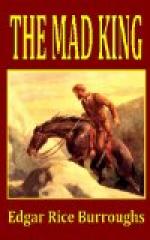“Sire,” he cried, “it is unnecessary that you take such grave risks. Your staff is ready and willing to perform such service that you may be preserved to your people and your throne.”
“I believe the men fight better when they think their king is watching them,” said the American simply.
“I know it, sire,” replied Von der Tann, “but even so, Lutha could ill afford to lose you now. I thank God, your majesty, that I have lived to see this day—to see the last of the Rubinroths upholding the glorious traditions of the Rubinroth blood.”
Barney led the reserves slowly through the wood to the rear of the extreme left of his line. The attack upon the Austrian right center appeared to be meeting with much greater success than the American dared to hope for. Already, through his glasses, he could see indications that the enemy was concentrating a larger force at this point to repulse the vicious assaults of the Luthanians. To do this they must be drawing from their reserves back of other portions of their line.
It was what Barney had desired. The three bombs from the aeroplane had told him that the Serbians had been sighted three miles away. Already they were engaging the Austrians. He could hear the rattle of rifles and quick-firers and the roar of cannon far to the northeast. And now he gave the word to the commander of the reserve.
At a rapid trot the men moved forward behind the extreme left end of the Luthanian left wing. They were almost upon the Austrians before they emerged from the shelter of the wood, and then with hoarse shouts and leveled bayonets they charged the enemy’s position. The fight there was the bloodiest of the two long days. Back and forth the tide of battle surged. In the thick of it rode the false king encouraging his men to greater effort. Slowly at last they bore the Austrians from their trenches. Back and back they bore them until retreat became a rout. The Austrian right was crumpled back upon its center!
Here the enemy made a determined stand; but just before dark a great shouting arose from the heights to their left, where the bulk of their artillery was stationed. Both the Luthanian and Austrian troops engaged in the plain saw Austrian infantry and artillery running down the slopes in disorderly rout. Upon their heads came a cheering line of soldiers firing as they ran, and above them waved the battleflag of Serbia.
A mighty shout rose from the Luthanian ranks—an answering groan from the throats of the Austrians. Hemmed in between the two lines of allies, the Austrians were helpless. Their artillery was captured, retreat cut off. There was but a single alternative to massacre—the white flag.
A few regiments between Lustadt and Blentz, but nearer the latter town, escaped back into Austria, the balance Barney arranged with the Serbian minister to have taken back to Serbia as prisoners of war. The Luthanian army corps that the American had promised the Serbs was to be utilized along the Austrian frontier to prevent the passage of Austrian troops into Serbia through Lutha.




